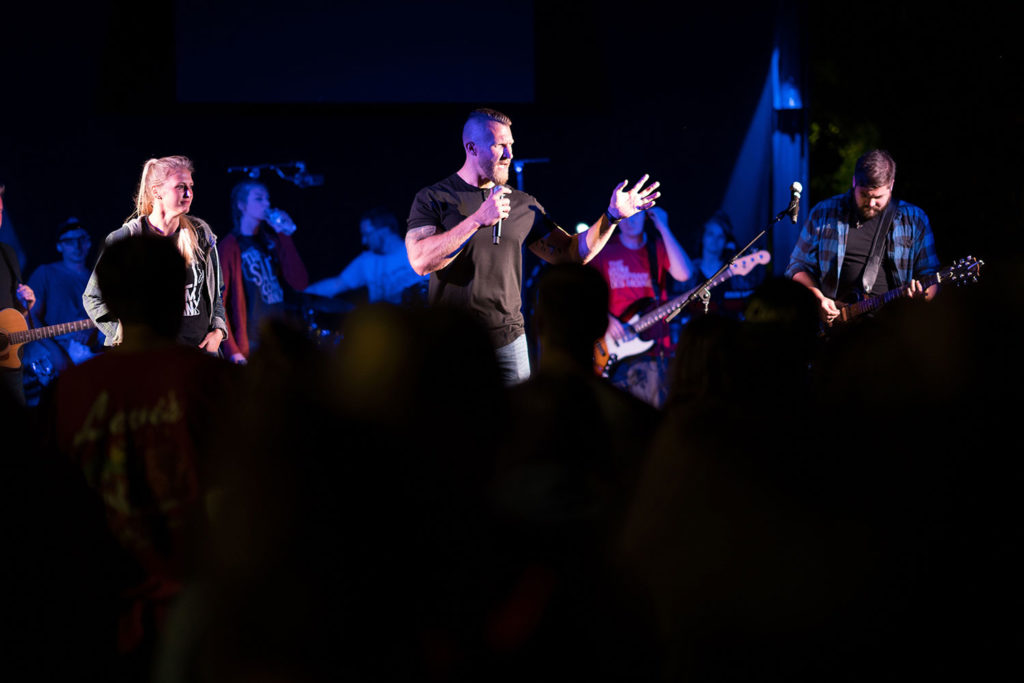By Tobin Perry
AMES, IA—When you go to Madison, Wis., one of the most secular college towns in North America, to plant a church, it helps to bring along some friends.
It’s especially helpful when you bring 30 to 40 friends.
Just ask Rob Warren, a North American Mission Board church planter who did just that thanks to the gospel partnership of his sending church, Cornerstone Church in Ames, Iowa.
“It’s strength,” Warren said. “It’s setting yourself up to succeed. Obviously, God has to breathe life into it or nothing will happen. But when you have a sending church like Cornerstone lifting you and supporting you in a very tangible way, that’s incredibly valuable.”
Warren launched Doxa Church in September 2018 to engage Madison and its 40,000 college students with the gospel. But before Rob and Lisa Warren moved their family to Madison, they spent 18 months at Cornerstone leaning on the church’s 25 years of experience planting churches in college towns.
Troy Nesbitt launched Cornerstone in 1994 out of a college ministry called The Salt Company from Grand Avenue Baptist Church in Ames. For much of the church’s early history, Cornerstone and its leadership avoided church planting in the United States and focused their attention on starting churches internationally.
“We were intentionally not going to be a church-planting church,” Nesbitt said. “It was actually stated that there were plenty of churches out there. We don’t have to start other ones. Our original motto was a local church with a global vision. And so we would send students to start churches, but they were international churches.”
In the first two decades of the church, Cornerstone started churches in China, Thailand and Albania.
But everything changed when Nesbitt’s daughter got a scholarship to play basketball at the University of Iowa. He and his wife visited the area to help his daughter find a church, but they couldn’t find one that seemed like a good fit.
“That’s what God used to get us to start a church at the University of Iowa,” Nesbitt said. “In 2010, we sent our director of The Salt Company (Cornerstone’s collegiate ministry) and most of the college staff to Iowa City to plant a church there.”
Nesbitt then replenished his college ministry staff with potential church planters and, in 2013, Cornerstone started a church in Cedar Falls, Iowa, the home of Northern Iowa University.
In 2016, Nesbitt resigned his position as the senior and founding pastor of Cornerstone to put his attention full-time to creating a network of church plants like Cornerstone in college towns around North America, particularly in the Midwest.
Cornerstone has now planted 11 churches throughout the Midwest (including Doxa Church in Madison) and are making plans to engage East Lansing, Mich., Gainesville, Fla., and Bloomington, Ind., in the next two years.
What makes Cornerstone’s model unique is that while they intentionally plant churches in college towns, they’re not planting churches of only students. That’s originally what attracted Warren to Cornerstone.
“We felt led to plant a church that was both for the city and for the campus, not just strictly a collegiate church,” Warren said. “I wasn’t even aware that anyone was really doing that. So when I met the Salt Company guys and told them my vision of going to Madison, they said, ‘That’s what we do—we plant churches for the city and for the campus.’”
Warren and his family then moved from Bowling Green, Ohio, to Ames, Iowa, to spend a year and a half learning from the Cornerstone team. Cornerstone then sent Warren and Ronnie Goble to Madison to start Doxa. Warren serves as Doxa’s lead pastor, and Goble serves as its director of The Salt Company, the church’s collegiate ministry. Warren and Gable serve alongside three other elders from Cornerstone who live in Iowa and provide oversight for the church until it can select its own elders.
Prospective church planters at Cornerstone spend two years in a residency program at the church. Those who plan on serving as lead planters spend a year in Cornerstone’s Salt Company, engaging college students, and another year in the church’s community ministries to get a glimpse into how it engages Ames beyond the Iowa State campus. The prospective Salt Company director spends two years serving as part of The Salt Company at Cornerstone.
“When you’re on your own, it’s like walking in to a battle with you and maybe a few of your friends, and you’re like, ‘Let’s go to war,’” Warren said. “But when you’re a part of a network, you’re rolling into battle with an army behind you that’s there for encouragement, that’s there for equipping, resourcing and all that stuff. It’s a tremendous blessing.”
Nesbitt says what The Salt Network provides Doxa and other church plants in terms of support, the Send Network and the North American Mission Board provides for them.
“The Send Network is a great resource for us,” Nesbitt said. “There’s shared collaborative learning that we get. There’re resources we’re able to utilize. There’s leadership that we’ve come in contact with. We would have never done this if we would not have been challenged to do so by Brian Frye (NAMB’s national collegiate strategist) and Kevin Ezell (NAMB’s president).”
Tobin Perry writes for the North American Mission Board.
MASHALLTOWN, Iowa (BP) — Southern Baptist Disaster Relief teams have begun cleanup work in Marshalltown, Iowa, following a devastating tornado July 19.
A Missouri Baptist Disaster Relief team arrived Tuesday to set up incident command at Iglesia Karios in Marshalltown. Chainsaw teams from Iowa have dispersed throughout the city to clear debris. An SBDR feeding team has prepared meals for recovery workers in the area.
Additional SBDR volunteers from Kansas-Nebraska and Florida already are on the ground in Marshalltown. Carlson, co-director of Iowa Baptist Disaster Relief, expects volunteers from other nearby states to arrive later this week and early next week. Teams from other states interested in providing assistance should contact their state disaster relief director.
“It looks like a war zone to tell you the truth,” Carlson said. “When you go downtown, you’ll see a lot of glass and brick everywhere.
“On the east part of town, there are about 10 blocks that are very heavily hit. There’s really not many trees standing. A lot of those homes aren’t livable,” Carlson said.
The EF-3 tornado injured at least 235 people in the town of 27,000 located 50 miles northeast of Des Moines. Carlson estimates that at least 100 homes were destroyed. Many more homes will take substantial work before people can return to live in them. Carlson believes it will take months, if not years, for Marshalltown to rebuild.
Some of the worst damage in Marshalltown came to the town’s courthouse and the brick buildings in the town square. In recent years officials and property owners had slowly worked to revamp the buildings, many of which are now destroyed. Jenny Etter, executive director of the Marshalltown Central Business District, estimates that the city had spent $50 million in building renovations since 2002.
A dozen or more tornadoes hit central Iowa last Thursday, according to the National Weather Service. The two biggest tornadoes, both rated EF-3, hit Marshalltown and Pella, with peak winds of 144 mph.
SBDR chaplains are also in Marshalltown to provide support and counsel to residents impacted by the tornado. Sam Porter, the North American Mission Board’s executive director of Southern Baptist Disaster Relief, prays the SBDR response will provide volunteers opportunities to share the Gospel.
“[The] number one goal with disaster relief is to earn the right to share the Gospel,” Porter said. “We work with those impacted. We treat them with respect. We pray with them. When they ask the question, ‘What makes you do this for no charge?’ that’s when you’ve earned the right to share the Gospel.”
The Marshalltown tornado comes on the heels of the SBDR response to flooding in Des Moines, Iowa, where teams wrapped up work last week. Eight people came to faith last week during SBDR efforts in the capital city, Carlson said.
Porter and Carlson urge Southern Baptists to pray for Marshalltown and the rest of Central Iowa.
“Pray for all the people who live here,” Carlson said. “A lot of them lost their homes. They lost their cars. They lost their job. There is a lot of a need here.”
Tobin Perry is a writer for the North American Mission Board.,
Published March 13, 2019



